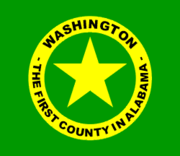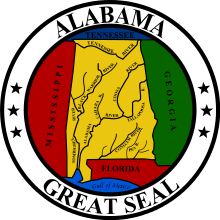Washington County, Alabama
| Washington County, Alabama | ||
|---|---|---|
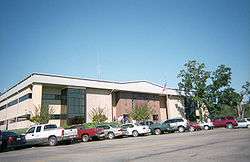 The Washington County Courthouse in September 2007 | ||
| ||
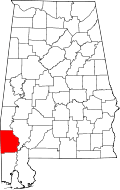 Location in the U.S. state of Alabama | ||
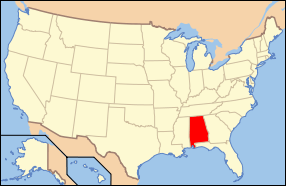 Alabama's location in the U.S. | ||
| Founded | June 4, 1800 | |
| Named for | George Washington | |
| Seat | Chatom | |
| Largest town | Chatom | |
| Area | ||
| • Total | 1,089 sq mi (2,820 km2) | |
| • Land | 1,080 sq mi (2,797 km2) | |
| • Water | 8.4 sq mi (22 km2), 0.8% | |
| Population (est.) | ||
| • (2015) | 16,804 | |
| • Density | 16/sq mi (6/km²) | |
| Congressional district | 1st | |
| Time zone | Central: UTC-6/-5 | |
| Website |
www | |
|
Footnotes:
| ||
Washington County is a county in the U.S. state of Alabama. As of the 2010 census, the population was 17,581.[1] The county seat is Chatom.[2] The county was named in honor of George Washington, the first President of the United States. It is a dry county, with the exception of Chatom.
History
The area of today's Washington County was long inhabited by various indigenous people. In historic times, European traders encountered first Choctaw and later Creek Indians, who had moved southwest from Georgia as early European settlers encroached on their land.
Washington County was organized on June 4, 1800 from the Tombigbee District of the Mississippi Territory by proclamation of territorial governor Winthrop Sargent. It was the first county organized in what would later become Alabama, as settlers moved westward after the American Revolutionary War. Washington County is the site of St. Stephens, the first territorial capital of Alabama. In 1807 former U.S. Vice President Aaron Burr was arrested at Wakefield in Washington County, during his flight from being prosecuted for alleged treason (which he was eventually found innocent of).
Even though the U.S. government removed most of the Choctaw and Creek to Indian Territory (now Oklahoma) west of the Mississippi River in the 1830s, some Native Americans remained behind and become state (and U.S.) citizens. They struggled to maintain their Choctaw culture through years during which the U.S. government imposed a binary system of dividing people into white and "all other" people of color (blacks and Indians). In 1979 Alabama recognized the MOWA Band of Choctaw Indians. Its members are concentrated along the border of Mobile and Washington counties.
In the 19th century, the county was largely developed for cotton plantations, with labor supplied by thousands of African-American slaves. Many were transported by slave traders to the Deep South in a forced migration. During the American Civil War, more than three quarters of the adult white men in the county were serving in the Confederate Army by 1863. In that year, a group of children petitioned the Confederate government to avoid drafting more white men, so they might serve as a home guard militia. The petition claimed it was needed to guard against a potential slave uprising, since there were numerous plantations with large numbers of slaves.
While the county continued to rely on agriculture into the 20th century, the infestation of the boll weevil destroyed many crops. Mechanization also reduced the need for labor, and thousands of African Americans left the South in the Great Migration to Northern and Midwestern industrial cities, where they could get better jobs and escape the legal segregation of the South.
The county has gradually developed other businesses and industry, particularly petrochemical. Due to damage from Hurricane Frederic, the county was declared a disaster area in September 1979.
Geography
According to the U.S. Census Bureau, the county has a total area of 1,089 square miles (2,820 km2), of which 1,080 square miles (2,800 km2) is land and 8.4 square miles (22 km2) (0.8%) is water.[3] This makes Washington County larger than the state of Rhode Island in terms of land area (but not total area). The county is located approximately 60 miles north of the Gulf of Mexico, and exceeds 682,000 acres of land. About 88 percent of the land area is situated forest and pine plantations.[4]
The Tombigbee River borders Washington County to the east. From the southern point of the river, the boundary runs diagonally south-west, bisecting the community of Calvert. From there, the southern boundary runs west, roughly following the 31°08' N parallel, towards the Mississippi state line, stopping just short before descending due south into Mobile County and forming part of a rectangle that connects with the state line. The western boundary is defined by the Alabama-Mississippi state line (approximately 88°27' W). The northern boundary runs west from the state line along the 31°41' N parallel until reaching the Tombigbee River.
Adjacent counties
- Choctaw County (north)
- Clarke County (east)
- Baldwin County (southeast)
- Mobile County (south)
- Greene County, Mississippi (southwest)
- Wayne County, Mississippi (northwest)
Transportation
Major highways
Railroad
The Norfolk Southern Railroad runs north out of the Port of Mobile and along the eastern corridor of Washington County, providing transport of raw materials to several chemical and electrical plants situated along the Tombigbee River.
Demographics
| Historical population | |||
|---|---|---|---|
| Census | Pop. | %± | |
| 1800 | 1,250 | — | |
| 1810 | 2,920 | 133.6% | |
| 1820 | 4,118 | 41.0% | |
| 1830 | 3,474 | −15.6% | |
| 1840 | 5,300 | 52.6% | |
| 1850 | 2,713 | −48.8% | |
| 1860 | 4,669 | 72.1% | |
| 1870 | 3,912 | −16.2% | |
| 1880 | 4,538 | 16.0% | |
| 1890 | 7,935 | 74.9% | |
| 1900 | 11,134 | 40.3% | |
| 1910 | 14,454 | 29.8% | |
| 1920 | 14,279 | −1.2% | |
| 1930 | 16,365 | 14.6% | |
| 1940 | 16,188 | −1.1% | |
| 1950 | 15,612 | −3.6% | |
| 1960 | 15,372 | −1.5% | |
| 1970 | 16,241 | 5.7% | |
| 1980 | 16,821 | 3.6% | |
| 1990 | 16,694 | −0.8% | |
| 2000 | 18,097 | 8.4% | |
| 2010 | 17,581 | −2.9% | |
| Est. 2015 | 16,804 | [5] | −4.4% |
| U.S. Decennial Census[6] 1790–1960[7] 1900–1990[8] 1990–2000[9] 2010–2015[1] | |||
2010
According to the 2010 United States Census Bureau, the racial makeup of the county is as follows:
- 65.5% White(non-Hispanic)
- 24.9% Black
- 8.0% Native American
- 0.1% Asian
- 0.0% Native Hawaiian or Pacific Islander
- 1.2% Two or more races
- 0.9% Hispanic or Latino (of any race)
2000
As of the census[10] of 2000, there were 18,097 people, 6,705 households, and 5,042 families residing in the county. The population density was 17 people per square mile (6/km2). There were 8,123 housing units at an average density of 8 per square mile (3/km2). The racial makeup of the county was 64.98% White(non-Hispanic), 26.89% Black or African American, 7.12% Native American, 0.06% Asian, 0.03% Pacific Islander, 0.05% from other races, and 0.87% from two or more races. 1.1% of the population were Hispanic or Latino of any race.
There were 6,705 households out of which 37.90% had children under the age of 18 living with them, 59.10% were married couples living together, 12.50% had a female householder with no husband present, and 24.80% were non-families. 22.80% of all households were made up of individuals and 10.10% had someone living alone who was 65 years of age or older. The average household size was 2.69 and the average family size was 3.17.
In the county the population was spread out with 28.70% under the age of 18, 8.60% from 18 to 24, 27.40% from 25 to 44, 22.90% from 45 to 64, and 12.40% who were 65 years of age or older. The median age was 35 years. For every 100 females there were 96.10 males. For every 100 females age 18 and over, there were 91.10 males.
The median income for a household in the county was $30,815, and the median income for a family was $37,881. Males had a median income of $35,237 versus $18,337 for females. The per capita income for the county was $14,081. About 14.80% of families and 18.50% of the population were below the poverty line, including 21.50% of those under age 18 and 22.70% of those age 65 or over.
Population decline
Like many rural Alabama counties, Washington County is experiencing rural flight—a steady decline of population due to emigration to cities—since 2000. Factors contributing to this phenomenon include depressed economic opportunity within the county and the ongoing urbanization of the United States. Urbanization, especially urban areas adjacent to a rural area, draws young people out of rural areas, offering more and better public services as well as access to better-paying, white-collar jobs.[11]
Education
The Washington County School system includes:[12]
- Chatom Elementary School
- Fruitdale High School
- Leroy High School
- McIntosh Elementary School
- McIntosh High School
- Washington County High School
- Career Technical Center
- Millry High School
Politics
| Year | Republican | Democratic |
|---|---|---|
| 2016 | 70.8% 6,031 | 27.8% 2,366 |
| 2012 | 65.6% 5,749 | 33.9% 2,971 |
| 2008 | 64.4% 5,654 | 35.0% 3,067 |
| 2004 | 61.4% 5,060 | 38.1% 3,145 |
| 2000 | 54.2% 4,117 | 44.6% 3,386 |
| 1996 | 37.7% 2,900 | 51.1% 3,935 |
| 1992 | 40.1% 3,270 | 49.6% 4,046 |
| 1988 | 52.2% 3,741 | 47.5% 3,402 |
| 1984 | 58.8% 4,434 | 40.8% 3,081 |
| 1980 | 46.0% 3,045 | 53.1% 3,520 |
| 1976 | 38.3% 2,171 | 61.2% 3,471 |
| 1972 | 74.7% 3,282 | 25.0% 1,096 |
Like much of the Deep South, prior to the Civil Rights Movement of the 1960s, Washington County voters generally supported the Democratic Party in national, state and local elections. After President Lyndon Johnson unveiled his Great Society policies, the county's traditionally small government, state's rights-oriented electorate began supporting Republican candidates in presidential elections. Following the presidency of Ronald Reagan and the rise of the Moral Majority of the 1980s, Washington County voters increasingly elected Republicans in national elections. Bill Clinton was the last Democratic presidential nominee to win Washington County, doing so in his successful 1996 reelection campaign.[13] While Democrats, until 2015, continued to represent the county in both houses of the state legislature, voters have not supported a Democratic candidate for governor since 2002, when the state's last Democratic governor, Don Siegelman, lost reelection to Republican Bob Riley.[14]
As of 2016, Elaine Beech (D-Chatom) has represented Washington County in the Alabama House of Representatives (District 65) since 2009.[15] Greg Albritton (R-Excel) has represented the bulk of the county (along with parts of 7 other counties, stretching into south Baldwin County and as far north as Choctaw County and from the Mississippi border on the west to as far east as the Escambia-Covington County border and Conecuh-Butler county border) in the Alabama Senate (District 22) since 2015.[16] An eastern sliver of the county along the Tombigbee falls in District 23, represented by Hank Sanders.[17]
The county lies within Alabama's 1st congressional district, which has been represented by Republican Bradley Byrne since 8 January 2014.[18]
Communities
Towns
Census-designated places
- Calvert (partly in Mobile County)
- Cullomburg (partly in Choctaw County)
- Deer Park
- Fairford
- Fruitdale
- Hobson
- Leroy
- Malcolm
- St. Stephens
- Sims Chapel
- Tibbie
- Vinegar Bend
Unincorporated communities
- Cortelyou
- Escatawpa
- Frankville
- Laton Hill
- Sunflower
- Wagarville
- Yellow Pine
- Yarbo
Ghost town
Places of interest
Washington County has three sites listed on the National Register of Historic Places:
- Andrews Chapel in McIntosh
- Old Washington County Courthouse
- Old St. Stephens Site in St. Stephens.[19]
The Washington County Museum is located in the courthouse in Chatom.
Notable people
- Wilmer Mizell (1930–1999) was born in Vinegar Bend. He was a left-handed pitcher in major league baseball who went on to serve three terms as a Republican congressman, representing North Carolina's 5th congressional district from 1969 to 1975.
- Beverly Jo Scott was born in Deer Park in 1959.
- Shawna Thompson, of the country music duo Thompson Square, is from Chatom.[20]
See also
- National Register of Historic Places listings in Washington County, Alabama
- Properties on the Alabama Register of Landmarks and Heritage in Washington County, Alabama
References
- 1 2 "State & County QuickFacts". United States Census Bureau. Retrieved May 17, 2014.
- ↑ "Find a County". National Association of Counties. Retrieved 2011-06-07.
- ↑ "2010 Census Gazetteer Files". United States Census Bureau. August 22, 2012. Retrieved August 22, 2015.
- ↑ http://www.washingtoncountyalgov.com
- ↑ "County Totals Dataset: Population, Population Change and Estimated Components of Population Change: April 1, 2010 to July 1, 2015". Retrieved July 2, 2016.
- ↑ "U.S. Decennial Census". United States Census Bureau. Retrieved August 22, 2015.
- ↑ "Historical Census Browser". University of Virginia Library. Retrieved August 22, 2015.
- ↑ Forstall, Richard L., ed. (March 24, 1995). "Population of Counties by Decennial Census: 1900 to 1990". United States Census Bureau. Retrieved August 22, 2015.
- ↑ "Census 2000 PHC-T-4. Ranking Tables for Counties: 1990 and 2000" (PDF). United States Census Bureau. April 2, 2001. Retrieved August 22, 2015.
- ↑ "American FactFinder". United States Census Bureau. Retrieved 2011-05-14.
- ↑ http://www.census.gov/newsroom/cspan/rural_america/20130524_rural_america_slides.pdf
- ↑ Schools, Washington County (2008-09). "Welcome to the Washington County Schools Website. ::". Retrieved 2009-05-26. Check date values in:
|date=(help) - ↑ http://uselectionatlas.org/RESULTS/index.html
- ↑ http://uselectionatlas.org/RESULTS/
- ↑ http://www.legislature.state.al.us/house/representatives/housebios/hd065.html
- ↑ http://www.legislature.state.al.us/senate/senators/senatebios/sd022.html
- ↑ http://www.legislature.state.al.us/senate/senators/senatebios/sd023.html
- ↑ http://www.startribune.com/politics/national/239312081.html
- ↑ National Park Service (2009-03-13). "National Register Information System". National Register of Historic Places. National Park Service.
- ↑ http://thompsonsquare.com/thompson-square
External links
- Washington County map of roads/towns (map © 2007 Univ. of Alabama).
- South Alabama Community Website
- Washington County Sheriff's Office
 |
Wayne County, Mississippi | Choctaw County |  | |
| |
Clarke County | |||
| ||||
| | ||||
| Greene County, Mississippi | Mobile County | Baldwin County |
Coordinates: 31°24′33″N 88°12′41″W / 31.40917°N 88.21139°W
